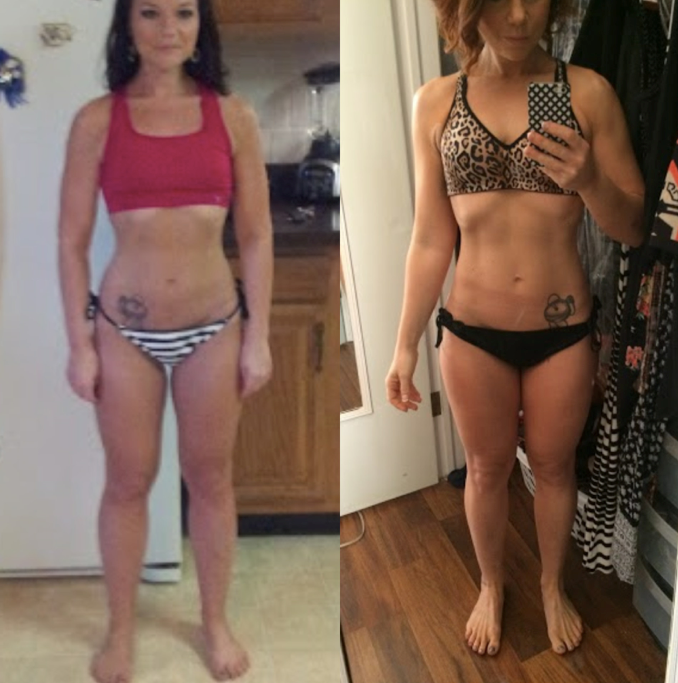Why Relying Solely on Scale Weight is a Losing Strategy

What does it mean to make progress?
Within the world of fat loss, most of the times, people will define “progress” as seeing the number on the scale go down within a certain period of time.
Scale weight is all fine and well, but there are numerous problems with using this single metric to determine how successful you are in your fat loss endeavors.
Somewhere out there, right at this very moment, someone is shedding tears after having stepped on the scale.
Somewhere out there, a well-meaning but woefully misinformed coach is instructing his client not to drink any water because tomorrow is her check-in day and she needs to weigh less.
Somewhere out there, a chronic yo-yo dieter is smiling triumphantly after plugging away for an hour on the treadmill because she’s lost five pounds of scale weight within that timespan.
Sigh.
Though there are numerous variables that influence the number on the scale, we’ve been conditioned to believe that any increase in bodyweight is indicative of fat gain, while conversely, a drop in bodyweight means that we’ve shed some fat.
Relying on scale weight without taking anything else into context is, in many ways, a losing strategy.
Consider the following factors that will make the scale weight go down:
cutting off a limb
clipping your nails, chopping off your hair, and taking off those heavy earrings
particularly horrific bout of diarrhea
Okay, so maybe the above was a bit tongue-in-cheek, but the point I’m trying to get at is that scale weight doesn’t measure anything except for the total mass of your entire body.
Don’t get me wrong: scale weight is absolutely a critical component of measuring progress. Regularly tracking scale weight and observing the general trend in which it’s moving can give you a good idea of whether or not you’re moving in the right direction toward your goal. Especially if you have a specific aesthetic goal, such as fat loss.
But.
It’s just one metric, as I said.
And without putting that scale weight into proper context, it’s impossible to know how to accurately interpret that information.
If your goal is fat loss, then yes, the general expectation should be that scale weight will move in a downward direction over time. But there are many, many factors that influence the reading.
Let’s explore a few.
Glycogen.
Without getting too science-y, think of glycogen as an energy reserve. It’s the form of carbohydrate that is stored primarily in your liver, muscles, and fat cells. For every one gram of glycogen stored in your body, it carries with it approximately three grams of water.
When you alter your diet by reducing your carbohydrate intake, your body has to dip into your glycogen stores for energy. This in turn depletes the amount of glycogen you carry in your body, and with this depletion comes water loss.
Conversely, when you enjoy one too many slices of birthday cake at the office, you may experience some alarming weight gain the next morning. This is not fat gain;it’s water retention. It’s temporary. A few days of solid dietary adherence should have the scale weight moving back down. No biggie.
This explains why many individuals – particularly with those high amounts of body fat to lose – observe a substantial drop in scale weight during the first few weeks on a diet. So don’t be discouraged when the weight loss (distinct from fatloss, mind you) starts to slow down. It doesn’t necessarily mean that your program is no longer working. Rather, it may simply be an indication that you’re not losing so much water anymore.
Hypertrophy (aka muscle gain).
If you are a beginner to the weight room and/or to proper strength training, if you are coming back to the gym after a long hiatus, or if you are using pharmaceutical assistance, then it may be the case that you experience simultaneous hypertrophy and fat loss, even while technically in a caloric deficit. This is a phenomenon known as recomposition, or recomp. Individuals can also experience this if they are switching from a really crappy training program to a proper one.
If this is you, then one of three things may happen:
1) scale weight goes up slightly even though you’re looking fitter and leaner
2) scale weight stays the same even though you’re looking fitter and leaner
3) scale weight goes down slightly, but not as much as you would have expected given how much fitter and leaner you’re looking
You’re gaining lean muscle mass and losing fat. At the same time.
If you ask me, this is the sweet spot that most people want to be in.
Digestion.
I’m just going to cut to the chase here: When was the last time you took a good, hearty poop?
Oh, what’s that? You’re constipated and you haven’t taken a dump in five days?
That may be explain the fact that scale weight hasn’t budged, even though you’re looking visibly leaner.
Just sayin’.
Dehydration.
Whether you simply didn’t drink enough water yesterday or had a particularly eventful night on the town with copious quantities of alcohol, being a dehydrated state will, quite obviously, manifest in scale weight.
Sure, maybe you work up this morning to find that you lost three pounds overnight, but don’t be surprised if that number bounces back up tomorrow after a solid day of hydrating.
Sodium intake.
Similar to glycogen, a high sodium intake can cause your body to retain water.
If you enjoyed a pizza last night, in other words, you may observe a bump in scale weight simply due to the fact that you consumed more salt than usual.
Same goes for the other way around. If you cut your sodium intake (which, by the way, I wouldn’t necessarily recommend, especially if you are a healthy and active individual), the scale weight will go down, and this will be indicative of water loss.
Menstrual cycle.
Gotta love hormones, eh?
During that time of month, it’s not unusual for women to experience anywhere between one to ten pounds of weight gain.
I assure you that this is not fat. It’s simply a sign that your tissues are holding onto extra water. Don’t let it mess with your head.
With that said, whenever you step on the scale (which should be first thing in the morning on an empty stomach and after your bathroom business, by the way), ask yourself the following questions:
Have I consumed more carbohydrates than usual?
Is there reason to believe that I have gained some muscle?
When did I last poop?
Did I drink enough water yesterday?
Did I consume alcohol yesterday?
Did I have a ton of sodium yesterday?
Has Aunt Flow come to pay me a visit?
Additionally, other valid questions to take into account:
How have my stress levels been?
How has my sleep been?
Remember: daily fluctuations are completely normal and are nothing to freak out over.
If your goal is fat loss, keep your cool and be as objective as possible. And while you don’t have to weigh yourself everyday, at the bare minimum, I’d recommend once a week or once every two weeks to ensure that things are moving in the right direction.
If you simply want to maintain where you are, you probably don’t have to weigh yourself frequently. If you’re looking more or less the same in the mirror and all your clothes are fitting you, then you’re probably fine. Scale weight is less important in this case.
Check out what my client (and now assistant) Lauren Dasher has to say about her changing relationship with the scale:
“A two-year transformation for miss Lauren Dasher. She weighs the same in both photos but looks very different now. ”
I spent most of my life as the cute but chubby friend. There was always a scale in my bedroom, and I was convinced that if I lost x pounds or hit x weight, then I would have my dream body. I started counting calories, and I dropped a little bit of weight. I began running regularly, and I dropped a little bit of weight. Somehow, I still didn’t have that dream body that I saw in my head.
But I love to learn, and I began to apply that to my goal. I learned how to count macros, and how to lift weights, and then I started working with Sohee two years ago to really see what I was capable of.
According to my paperwork, I began a fat loss phase under her coaching at 110 pounds on my 4’11” frame. I’ve been with her through a few periods of fat loss and reverse dieting by now, and my body has changed more than I ever thought possible. My weight has been a less interesting story. At my lowest, the scale reflected 104 pounds; today I weigh 2-3 pounds MORE than when I began with Sohee. If I only relied on weight to tell me I was successful, perhaps I would feel like I had taken steps back.
However, the rest of the story tells me that I’m two clothing sizes smaller, I look leaner, I eat a heck of a lot for my size, and I’m much, MUCH stronger.
Over the past few years, I’ve learned to use the scale as one tool to track my progress, but there is no emotional attachment to it.
The second time that I used macros for fat loss, my lowest scale weight never reached that first low of 104 pounds. I doubt it ever will again.
My body is strong, I’m reaching my goals, and it’s a beautiful thing.
The only numbers I’m concerned about these days are the plates on my barbell and the grams of protein in my dinner.
Again, context matters. If you’re going to be stepping on the scale, make sure that you’re taking body circumference measurements, pay attention to how your clothes are fitting and how you’re looking in the mirror, take progress pictures, and also be honest with yourself about your dietary adherence.
Then use the entirety of all the above information you’ve compiled to make an objective assessment of how you’re doing.
If you’ve lost two inches off your waist but the scale weight hasn’t budged, you have made progress.
If you see a little bicep peeking through but the scale wight hasn’t budged, you have made progress.
If the scale weight has spiked but you’ve also been eating everything but the kitchen sink – well, then maybe a dietary intervention is necessary.
(At the end of the day, however, if stepping on the scale weight gives you a panic attack, then you may want to consider breaking up with the damn thing.)
Know that the number blinking back at you is in no way, shape, or form a reflection of your value as a human being.
There is so much more to health and happiness than the number on the scale.




